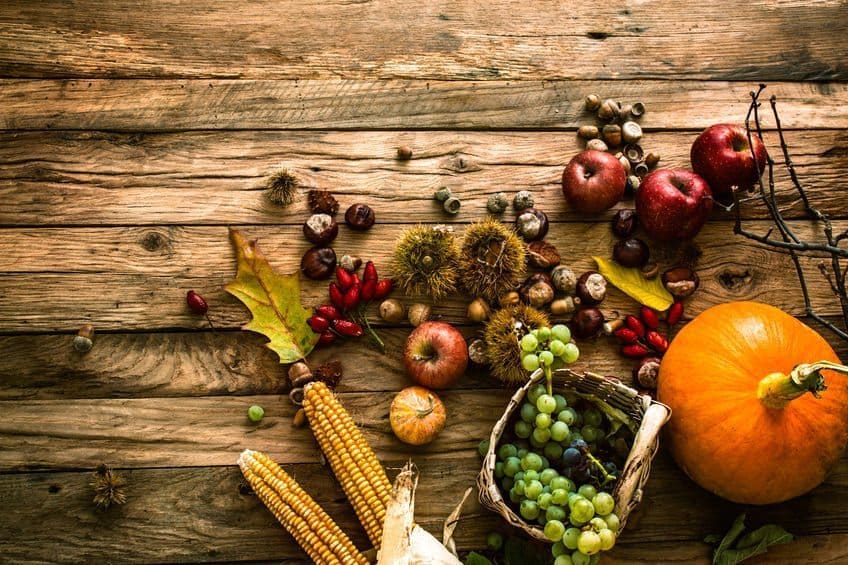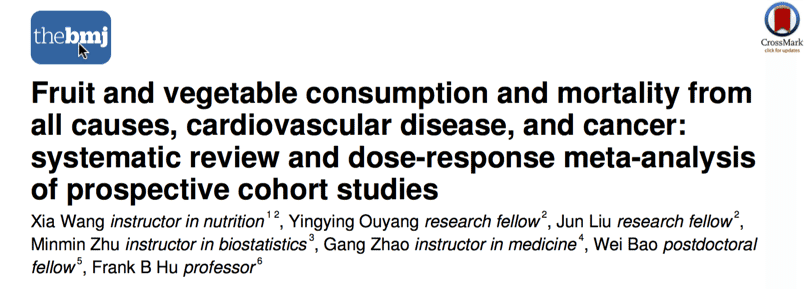
You are going to absolutely hate me. But I have to tell you the truth as I see it.
There is nothing more sacred to the conventional line then the fact that consuming more fruits and vegetables makes you healthier leads to less cancer, less heart disease, and a longer life.
Right?
But that’s not what the studies say. In fact, there are many many studies, that have been done with hundreds of thousands of people, and no study has shown any really significant improvement in lifespan, or lowering of coronary heart disease, or less cancer, from high consumption of fruits and vegetables.
There are many studies in fact that I’m going to show you right now, showing a different story.
This is what is known as a meta-study, and it is based on a very lousy methodology. But it does show a trend that has been verified in study after study, and I think that there is a lot of accuracy to what it’s pointing to.
They studied people who consume more fruits and vegetables.
This study focused on the risk of lung cancer.
They asked people about smoking status, and a lot about diet.
Now I know that you are thinking from the title of the study, that the higher fruit and vegetable consumption leads to lower incidence of lung cancer and death from lung cancer, right?
 Pay close attention here. The study says that if you smoke, you lessen your risk of death by 4% to 8%, simply consuming lots of fruit and vegetables.
Pay close attention here. The study says that if you smoke, you lessen your risk of death by 4% to 8%, simply consuming lots of fruit and vegetables.
Yes this is a very small number.
It is a meaningless number really.
And in fact, for people who do not smoke and have never smoked, there was no improvement in lifespan or lung cancer, and there was no reduction in lung cancer incidence, with people consuming more fruits and vegetables.
The association with fruit and vegetable intake was …not significant in former or never smokers.
In other words, if you never smoked, or you stop smoking, fruits and vegetable consumption has no bearing on survival or getting lung cancer.
There are 158,000 deaths from lung cancer, in 2016, projected by the American Cancer Society. Even a 8% reduction means 12,000 fewer deaths, but that’s with over 300,000,000 people in the United States alone.
This is way less than the risk of getting murdered in the United States, which is already a vanishingly small number, less than 1 in 100,000.
But what about other forms of cancer? Surely fruits and vegetables protect us against other cancers?
Let’s just continue looking at the big question:
Does higher fruit and vegetable consumption lead to less heart disease, a longer life, and less cancer?
You are going to hate me. I get so much hate mail already. People will say that I cherry pick the studies, or that I’m biased.
Actually, these researchers cherry picked the studies that they addressed.
The last thing they wanted to do was show no improvement consuming fruits and vegetables in coronary heart disease or cancer.
They wanted to show a strong association. They were very biased towards finding a strong association between higher fruit and vegetable consumption, longer life, and lower risk of cancer.
But they didn’t find it.
And this is one of many studies. Well, they did actually find some reduction.
 The study investigated “total consumption of fruit and vegetables…with a total of 469,551 participants and 6893 cardiovascular deaths.”
The study investigated “total consumption of fruit and vegetables…with a total of 469,551 participants and 6893 cardiovascular deaths.”
“Fruit consumption was examined in six studies with 677,674 participants and 9744 cardiovascular deaths, and vegetable consumption was examined in…with of 677,674 participants and 9744 cardiovascular deaths.”
So don’t say that I’m cherry picking. That’s a lot of studies, and that’s a lot of deaths. And you should be able to rely on the number there to mean something. Given that the researchers are heavily biased to finding a Association between high consumption of fruits and vegetables, and better health,…
The average reduction in the risk of cardiovascular disease mortality was 4%
And that is a relative risk. 4% means that out of 1 million people, if 100,000 die over a decade, then 40,000 fewer would die who consumed a lot of fruits and vegetables. Over 10 years, given the fact that in that 10 years, 500,000 would have died from auto accidents.
In fact, the reality is this: consuming fruits and vegetables is not proven at all to lengthen life, reduce heart attacks, or reduce cancer.
There are some fruits and vegetables that are super special
For example, in some cases it may be helpful to consume high amounts of ginger, or garlic, or onions, just to think of a few.
I think good ripe fruit is extremely helpful to longevity.
The trouble is so much fruit is moldy, or is it ripe when it’s pick.
And it’s very irritating to our gut, and actually can hurt us.
There are many fruits and vegetables that are very good for you, and that have all kinds of really amazing ingredients in them that could actually lower our risk of cancer, or even cure our bodies if we get cancer.
There are fruits and vegetables that we should consume if we have high blood pressure, or heart disease, or stroke, some of which you never thought of.
Fruits and vegetable consumption, done right, can vastly improve health — here are my rules to live by
Avoid fruit that has mold or bruises — they contain mold that is quite carcinogenic and toxic.
Avoid fruit that isn’t ripe. (unless you cook it first)
Avoid undercooked vegetables — they create endotoxins in the gut.
Avoid potatoes that aren’t well cooked — they contain solanine that is toxic.
Avoid mushrooms that aren’t well cooked — they contain cancer-causing hydrazine.
Avoid ANY undercooked greens — they create endotoxins.
Don’t feel guilty if you don’t eat fruits and vegetables
I hope you eat a good diet though.
- A good diet has low iron,
- has a favorable calcium to phosphorus ratio,
- includes virtually no PUFAs, because PUFAs are the worst thing possible to consume.
- A good diet also provides plenty of protein, generally 80 g to 100 g per day for the average person, for maximum liver health.
- A good diet encourages low growth of bacteria in our gut, and low amounts of endotoxins to challenge our liver.
There are many ways of living on a good diet.
There are people that are super healthy who consume a gallon of milk every day.
There are people who are super healthy who consume tons of fruits and vegetables.
There are people who are super healthy who consume a lot of meat, fish, this seafood, and other protein.
However, if you’re not feeling tiptop, if you’re on any kind of medication, you do want to look at fruits, vegetables, supplements, vitamins, and nutrition in general, because chances are good that you can resolve whatever is wrong with you through nutrition.
But it’s not so simple as consuming more fruits and vegetables, as this in many studies show.
Citations
Fruits, vegetables and lung cancer risk: a systematic review and meta-analysis
http://www.ncbi.nlm.nih.gov/pubmed/26371287
Fruit and vegetable consumption and mortality from all causes, cardiovascular disease, and cancer: systematic review and dose-response meta-analysis of prospective cohort studies
http://www.bmj.com/content/349/bmj.g4490
Key statistics for lung cancer
http://www.cancer.org/cancer/lungcancer-non-smallcell/detailedguide/non-small-cell-lung-cancer-key-statistics
USA CAUSES OF DEATH BY AGE AND GENDER
http://www.worldlifeexpectancy.com/usa-cause-of-death-by-age-and-gender
Click for more information on Lung cancer, for information on Living Healthy, or for more on an analysis on lung cancer.
